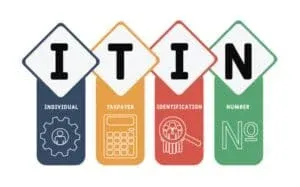
Imagine this: It’s tax season and you’re, by law, required to file your taxes or claim return where it’s possible. However, to be eligible for that, you have to have either an SSN (Social Security Number). While an SSN is commonly used by permanent residents of US citizens, it’s not always available for everyone, especially to people who aren’t US citizens or residents. If you have a foreign status and you’re living or working in the US, you’re required to have an ITIN.
What is an ITIN?
ITIN, better known as an Individual Tax Identification Number, is issued by the Internal Revenue Service and consists of 9 digits. They are given to individuals who are required to pay taxes but do not qualify for the SSN.
Regardless of whether or not the individual has a resident or non-resident alien status, the IRS can still issue them an ITIN if it is a requirement or simply if the individual needs it as ITIN allows individuals a greater degree of privacy.
Moreover, there are several benefits of having an ITIN instead of an SSN. Some of these benefits include:
• Opening a bank account to build credit history—thereby making it easier for individuals to obtain loans.
• File income taxes and get a return or credit
• Establish a business in the US
What Tax Credit Can ITIN Holders Claim?
With an ITIN, you are eligible for some tax credit. While this excludes EITC, you can still claim ACTC (Additional Child Tax Credit) or CTC (Child Tax Credit). However, even to get these credits, you have to be eligible. Here are some things that will make you eligible for the tax credit:
• Your children have been living at home for half a year or more
• They are under the age of 17
• They should be your foster children, stepchildren, siblings, stepsiblings or stepchildren.
• Your children should be a US citizen or resident
If the above conditions are in your favor, you can apply for a tax credit and get a significant amount in return. For instance, in California, tax filers can get up to $3500 in tax credits depending on the size of the family and the level of income.Get your $50 coupon.
Expiration of ITIN and Renewal Process
The good thing about an SSN is that it doesn’t expire. On the other hand, an ITIN can expire if you don’t file the taxes for 3 consecutive years. For instance, your ITIN will expire in 2020 if you haven’t paid taxes for the years 2018, 2019, 2020, and 2021.
However, keep in mind that not all ITINs will expire, especially if it’s not being used for the sole purpose of filing income tax. If your ITIN is being used for informational purposes, you don’t have to renew it.
In case your ITIN does expire, renewing it is very straightforward. Just submit a W-7 form (the same form that you filled out to get an ITIN), give the IRS your tax returns, and attach some form of identification along with the required documents. It should be renewed very quickly.
However, one thing you should be careful about is how you submit it. While applying for an ITIN the first time, you can easily apply electronically, but that’s not the case when you’re applying for a renewal. You have to submit the hard copy of the form to the IRS Taxpayer Assistance Center.
You can also visit the Volunteer Income Tax Assistance (VITA) after making an appointment. They can review your documents and give them back to you immediately. Lastly, you can also mail the documents yourself to the address given on the W-7 form. The downside is that you will have to submit your original documents and it can take up to several weeks for them to return the documents. So if you need it soon, be sure to apply in person.
The Length of the Process
It doesn’t take that long to get your ITIN renewed. Once the IRS has reviewed your complete application, going through the documents that you have provided, and verified your case, you should hear back from the IRS within 7 to 11 weeks.
If you’re confident you have submitted everything correctly and haven’t heard of any response from the IRS, you can always give them a call at 1-800-829—1040 and ask them about the status of your application. It’s a toll-free number so you don’t have to worry about the cost. However, if you’re based outside the US, you should call 1-267-941-1000. But keep in mind that it’s not a toll-free number.
Of Rejections and Refusals
In case your application is rejected, you will have to find the error, fix it, and reapply. The IRS will give you a letter stating what was wrong so it’ll be easier to fix. However, if you feel that the error isn’t on your part, you should call the IRS and get to the bottom of it ASAP.
Of course, you can always pay a visit to the nearest Taxpayer Assistance Center and find out what went wrong with your application. Taking help from them can be beneficial, especially if you’re not sure where you went wrong or how to proceed from the mistake.
On that note, it is also important to mention that you have to update your address with the IRS as soon as it changes. You should inform the IRS ASAP to avoid any delays. Remember, the refusal letters or the return of original documents will be sent to your home. Moving out and not informing the IRIS will only create problems for you.
Last Words
ITIN is a crucial component and one that offers you several benefits apart from allowing you to file taxes in the US as you work. Be sure to stay on top of it. If you are confused at any point, make an appointment with the local professionals who can guide you better.More information please contact us!

